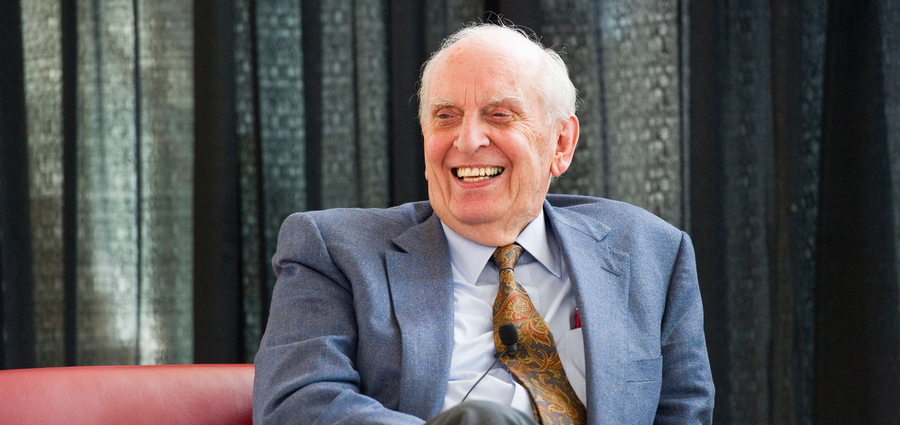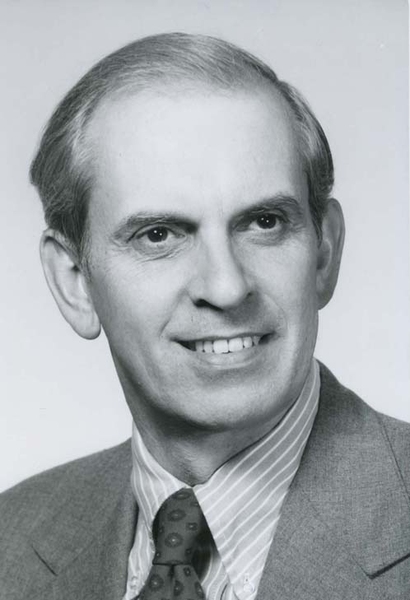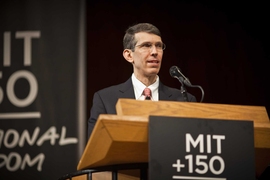William Pounds, a former dean of the MIT Sloan School of Management who was known for his ubiquitous presence around campus and mentorship of junior faculty members, and for advising the broader Institute through the turbulent years of the Vietnam War, died Aug. 23. He was 95.
Pounds joined MIT Sloan in 1961 as an assistant professor and became dean in 1966. After stepping down from that role in 1980, Pounds was senior advisor to the Rockefeller family from 1981 to 1991. He served on boards for a wide range of organizations, including Idexx, General Mills, Putnam Investments, Sun Oil Co. (now Sunoco), the Museum of Fine Arts Boston, and WGBH. He was an active member of the American Academy of Arts and Sciences.
“Through his great gifts and skills and determination, Bill brought the MIT Sloan School into the modern landscape of management education and research,” says David Schmittlein, who has served as dean since 2007. “Much of what has been accomplished during my time at MIT has been shaped by his voice and guided by his vision. Bill’s legacy for the school is, and will remain, unequaled.”
Pounds earned a degree in chemical engineering from the Carnegie Institute of Technology (now Carnegie Mellon University) and flew fighter planes with the U.S. Navy during the Korean War.
He gained operations management experience working for companies like Kodak and Pittsburgh Plate Glass, which supplied automobile paint to General Motors. He was working for PPG when then-dean Howard Johnson invited him to MIT Sloan to teach production management.
In a 2009 interview, Pounds said he came to MIT Sloan with a respect for industry workers and a commitment to helping the organizations employing them operate as well as they could.
“That’s how I see the Sloan school: It’s an enterprise aimed at producing people who are capable of making whatever part of the world they may be involved in work better,” Pounds said.
Pounds directly shaped the future of both the management school and the overall institute during his decades of academic service.
The “Pounds Panel"
On March 4, 1969, faculty members, scientists, students, and other members of the MIT community gathered on campus to protest the U.S. Department of Defense’s funding of two Institute laboratories in the midst of the Vietnam War. Pounds was appointed chair of a review panel organized to consider whether action should be taken related to the labs. It would ultimately be known as the Pounds Panel.
“It was like Noah’s Ark of conservative and radical students and faculty and staff members from the laboratory, members of the [MIT] Corporation, alumni, faculty, on and on,” Pounds said in the 2009 interview. “Just every shade of constituency was represented.”
Some felt that the laboratories were serving the nation’s interests, while others felt that the work was evil and could have terrible effects on the world. But both sides felt that if the work had to be done, it was better to do it at MIT.
“The two groups could agree that the work should stay at MIT for almost opposite reasons,” Pounds said. “And as long as we didn’t ask them to agree on the reasons, they could agree on the conclusion.”
A cheerleader and constructive critic
While leading MIT Sloan, Pounds said he put most of his attention into building out the school’s faculty. “It’s really [the] selection of people and then encouraging them to do what they do best,” Pounds said.
Among those he encouraged was MIT Sloan professor and Nobel laureate Robert Merton. In 1970, Merton was a junior faculty member in the school’s finance group. There had been an explosion of interest in financial science, and Merton and other junior faculty members at the time, including Stewart Myers and Myron Scholes, were trying to expand their research and practice, but without the benefit of senior leaders. Pounds encouraged the cohort to keep going.
“He had the ability to say, ‘Hey, even if it isn’t conventional or the usual way we would do this, this makes sense,’” said Merton, who, along with Scholes, was awarded the Nobel Memorial Prize in Economic Sciences in 1997.
During Pounds’s 14-year term as dean, MIT Sloan’s faculty expanded to include names like Lotte Bailyn, Arnoldo Hax, Thomas Magnanti, John Van Maanen, Eric von Hippel, and Phyllis Wallace.
After Pounds heard Wallace give a talk about her research on Black teenage women in the labor market, he invited her to be a visiting professor in 1973. Wallace was the first woman to receive tenure at MIT Sloan and the first to be promoted to full professor.
Bailyn, who became the second tenured woman at MIT Sloan, said she valued Pounds’s opinion.
“He was a constructive critic of some of the work we were doing, as he was for many people,” she said.
Pounds was frequently seen around the MIT Sloan campus lunching with students in the cafeteria or poking his head into faculty offices. One of those offices belonged to Professor Andrew Lo, who joined MIT Sloan in 1988 as an assistant professor in the finance group. Even though Pounds hadn’t recruited Lo, the emeritus dean took an interest in the junior faculty member’s work.
“He gave honest feedback about my ideas and was quite realistic in the opposition that I would face with my colleagues,” Lo says of his early work in developing his adaptive markets hypothesis. “But he also gave me perspective and said, ‘If you persist, you will eventually be rewarded.’”
A “pragmatic visionary”
Tom Pounds SM ’88 says his father was “a pragmatic visionary” who approached everything he did with his feet firmly on the ground, but also with a curiosity and desire to translate his own experience and observations into deeper insights that could improve management practice broadly.
“He got a reputation as an unusually thoughtful board member who was going to do much more than lend his title to the role,” Tom Pounds says. “He was the one who could be counted on to ask hard questions and to work with his fellow directors to enhance their collective performance and impact.”
In early 2023, father and son published a collection of essays, “What Is This Management? Essays on Corporate Governance and Management Education,” which included reflections on the elder Pounds’s career in corporate governance and management.
Along with a legacy of philanthropic support to MIT and other institutions, the Pounds family recently endowed the William and Helen Pounds Fellowship Fund to support up to four MIT Sloan graduate students per year.








